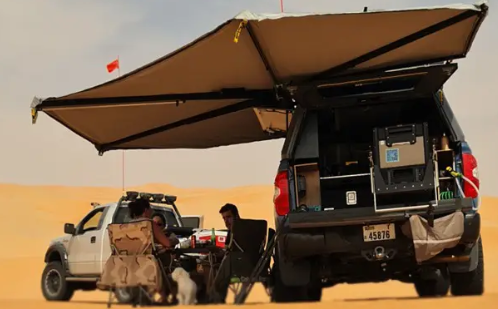Exploring the Rise of the Roof Top Tent in Dubai's Outdoor Adventure Scene

Dubai is widely recognized for its ultra-modern skyline, luxury living, and world-class amenities. Yet, beyond the glittering cityscape lies a different kind of appeal—vast deserts, dramatic mountain ranges, and rugged coastlines that beckon adventure seekers. In recent years, a new trend has emerged among residents and outdoor enthusiasts: the increasing use of the roof top tent Dubai.
As more individuals pursue camping, overlanding, and weekend escapes from the urban grind, the roof top tent has become a practical and popular solution for sleeping under the stars without leaving behind the comforts of a vehicle-based lifestyle. This article explores the growing interest in roof top tents in Dubai, their functionality, relevance to the UAE's natural landscape, and the cultural and environmental factors influencing their adoption.
What Is a Roof Top Tent?
A roof top tent is a foldable or pop-up tent designed to be mounted on the roof of a vehicle, typically an SUV, pickup truck, or 4x4. Unlike ground tents, roof top tents elevate campers off the ground, offering better protection from wildlife, uneven surfaces, and sand or moisture. These tents can be hard-shell or soft-shell, with ladders for access and built-in mattresses for comfort.
The concept originated from off-road and overland travel in regions where rugged conditions made traditional camping impractical. Over time, the roof top tent evolved into a versatile, mobile sleeping solution that combines the convenience of vehicle travel with the flexibility of spontaneous outdoor stays.
Why Roof Top Tents Are Gaining Popularity in Dubai
While the idea of rooftop camping may seem novel in an urban metropolis like Dubai, several factors contribute to its growing adoption in the region.
1. Proximity to Outdoor Destinations
Dubai’s central location makes it an ideal base for exploring the UAE's diverse landscapes. Within a few hours’ drive, residents can reach the sand dunes of Liwa, the rocky mountains of Hatta, or the beaches of Fujairah. The roof top tent in Dubai provides a convenient way to transition from city life to the outdoors without needing specialized camping grounds or hotels.
With a roof top tent, adventurers can set up camp wherever it is legal and safe to do so, eliminating the need for complex logistics or heavy ground-based equipment.
2. Climate and Terrain Suitability
The UAE's desert terrain is beautiful but can pose challenges for ground camping—loose sand, sharp rocks, and nocturnal wildlife can make it difficult to pitch a traditional tent comfortably or securely. A roof top tent bypasses these issues by elevating the sleeping area, offering better ventilation and safety from desert creatures such as snakes and scorpions.
Additionally, during the cooler months from October to April—peak camping season in the UAE—the tent’s elevation allows for better airflow and nighttime cooling, which are highly desirable in the desert environment.
3. Increasing Interest in Overlanding
Overlanding—a form of long-distance travel using self-sufficient vehicles—has seen growing interest among UAE residents. Many overlanders prefer the roof top tent because it allows them to rest anywhere their vehicle can reach, regardless of terrain. It’s a practical choice for exploring remote wadis, highlands, and border regions near Oman or Saudi Arabia, especially where hotel accommodations are sparse or unavailable.
Dubai-based travelers are increasingly participating in regional overlanding events and group expeditions, where a roof top tent is considered standard gear.
Practical Advantages of a Roof Top Tent in Dubai
The appeal of a roof top tent in Dubai goes beyond aesthetics or adventure trends. The product offers several functional benefits that suit the UAE’s unique environment and cultural context.
1. Quick Setup and Takedown
One of the biggest advantages of roof top tents is the speed at which they can be deployed. Unlike traditional tents that require ground clearing, pegging, and alignment, a roof top tent typically unfolds in minutes. This makes it ideal for spontaneous trips or late-night arrivals at campsites.
In areas near Dubai where camping is permitted but facilities are minimal, this ease of use becomes especially valuable.
2. Space Efficiency
For city dwellers in Dubai, storage is often limited. Roof top tents, while larger than ground tents when mounted, don't take up precious cargo space inside the vehicle. This frees up room for other essentials like food, water, and recovery gear—especially important in remote desert regions where self-sufficiency is crucial.
3. Elevated Comfort and Cleanliness
The elevation provided by a roof top tent protects users from sandstorms, ground insects, and damp terrain. In the UAE's desert areas, even slight moisture in the early morning can make ground sleeping uncomfortable. Roof top tents offer built-in mattresses and enclosed sleeping areas that stay cleaner and more insulated than ground-level options.
Cultural Considerations in Dubai’s Camping Scene
Dubai is home to a diverse population with varied cultural norms and expectations, especially around privacy and modesty. A roof top tent provides a discreet, self-contained space that can be more culturally appropriate than open ground tents in shared or public camping areas.
For families or mixed-gender groups, the ability to set up private sleeping quarters quickly and safely is important, especially when camping in areas with other visitors. Roof top tents cater to these needs by offering enclosed, elevated spaces that can be entered and exited with minimal exposure.
Environmental Responsibility and Regulations
As outdoor travel grows in popularity around Dubai, so does the need to practice responsible camping. Roof top tents, when used correctly, can support low-impact travel. Because they don’t require pegging into the ground or clearing brush, they reduce environmental disruption to desert and mountain ecosystems.
However, it’s important to recognize that not all areas in or around Dubai allow free camping. Campers using roof top tents must be aware of local regulations and respect protected areas, especially in nature reserves and conservation zones. Some emirates have designated camping areas or require permits for overnight stays, even if the setup is vehicle-based.
Challenges of Using Roof Top Tents in the UAE
Despite the many benefits, there are also practical challenges associated with using a roof top tent in Dubai, particularly for first-time users.
1. Height Restrictions in Urban Areas
When mounted, roof top tents can add considerable height to a vehicle, potentially causing issues with parking in underground garages or navigating certain urban areas. Dubai’s infrastructure is modern, but not all parking areas accommodate vehicles with roof-mounted equipment.
2. Wind Exposure
While elevation offers many advantages, it also exposes the tent to wind. The desert can experience sudden gusts, especially in open areas. Campers must secure the tent properly and avoid setting up in locations that are too exposed or unstable.
3. Cost and Accessibility
Roof top tents represent a more significant investment than ground tents, and not all vehicles are suited to carry them. Installation typically requires a heavy-duty roof rack or mounting system. While interest in this camping method is growing, the initial setup cost may still be a barrier for some residents.
Popular Locations Around Dubai for Roof Top Tent Camping
While wild camping is subject to regulations, several locations near Dubai are popular among roof top tent users:
-
Al Qudra Desert: Easily accessible from the city, Al Qudra offers open desert landscapes suitable for vehicle-based camping.
-
Fossil Rock and Mleiha: Located in Sharjah, these areas offer desert terrain with archaeological significance and stargazing opportunities.
-
Hatta: With its cooler climate and mountain views, Hatta is a favorite destination for campers year-round.
-
Jebel Jais: The UAE’s highest peak offers breathtaking views and rugged terrain for experienced overlanders.
-
Liwa Desert: For those looking for a deep desert experience, Liwa offers challenging dunes and remote tranquility.
Conclusion
The emergence of the roof top tent in Dubai reflects broader lifestyle changes as residents seek balance between urban living and nature-based recreation. With its ability to adapt to various terrains, climates, and cultural considerations, the roof top tent offers a versatile and practical solution for exploring the UAE’s diverse landscapes.
As outdoor travel and overlanding continue to grow in popularity across the Emirates, the roof top tent stands out as a defining feature of this movement—one that enables freedom, comfort, and deeper connection with the natural beauty surrounding Dubai.








